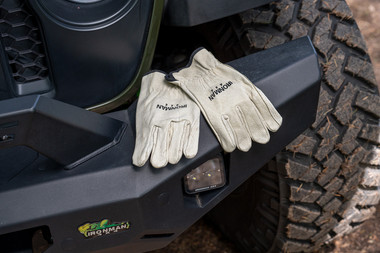Frontier 9,500 lb Winch with Synthetic Rope
SUPERIOR DURABILITY: Built with over a decade of development, the Frontier Winch Range offers unmatched reliability with low-maintenance, synthetic rope designed to withstand the toughest conditions.
WATER RESISTANT DESIGN: With an IP68 rating, the winch can be submerged up to 5 feet for 30 minutes, allowing you to tackle wet and muddy terrain without compromising performance.
ADVANCED BREATHER TECHNOLOGY: The built-in breather protects seals by expelling moisture, enhancing the winch's durability and longevity, even in extreme environments.
DUAL REMOTE FUNCTIONALITY: Equipped with both wireless and plug-in remote controls, the Frontier Winch offers flexible control options, ensuring safety and convenience during recovery operations.
POWERFUL PERFORMANCE: Powered by robust 4.5 HP(9,500 lb) or 6 HP (12,000 lb) motors, with up to 28 to 34 feet per minute line speed, this makes for a powerful and efficient tool for all your recovery needs.
LONG-TERM WARRANTY: Backed by a 5-year mechanical warranty, the Frontier Winch delivers peace of mind with its proven mechanical design and reliability in the harshest environments.
Installation Instructions:
| RATING & PERFORMANCE | |
| Rating | 9,500 lb |
| Motor | 4.5 HP |
| Power |
Voltage: 12 V Current Draw @ 12 V: 74 Max Current Draw @ 12 V: 350 |
| Line Speed |
No Load: 34.56 ft/min Full Load: 7.38 ft/min |
| Water Ingress | IP68 |
| Breather | Included |
| Gearing |
Ratio: 218:1 Type: 3 Stage Planetary |
| Brake | Auto cam lock-in brake |
| Clutch |
Clockwise-disengage Counterclockwise-engage |
| RECOVERY LINE | |
| Line |
Type: Synthetic Rope Diameter: 3/8" Length: 82 ft Breaking Load: 19,000 lb Rope Connection: Spliced Lug |
| Controller |
Wireless Remote & Wired Battery: CR2450 |
| Hook | Steel Hinged |
| Fairlead | Hawse |
| Hand Strap | Yes |
| WEIGHT & DIMENSIONS | |
| Dimensions |
With Control Box: 21.1 x 6.3 x 10.5" Without Control Box: 21.1 x 6.3 x 7.2" |
| Weight | 60.5 lbs |
| Power Cable |
Size: 0 AWG Material: Copper Control Box Length: 24" x 3 pc Positive (Red) Length: 81.1" x 1 pc Negative (Black) Length: 82.7" 1 pc |
| CERTIFICATION | |
| Certification | CE |
FAQ
What is the difference between Steel Cable and Synthetic Rope?
When choosing a winch, one of the key decisions you'll face is whether to go with a steel cable or a synthetic rope. Both have distinct advantages, and the right choice depends on your specific needs and priorities.
Synthetic ropes have some clear benefits. They are much lighter than steel cables, which makes them a popular choice among many off-roaders and overlanders. Another advantage is that synthetic ropes store far less energy when under tension, which can reduce the risk of dangerous recoil if the rope snaps. Additionally, synthetic ropes don’t develop sharp burrs or rust, unlike steel, making them safer to handle after heavy use. However, they are more susceptible to abrasion damage and wear, especially when dragged over rough surfaces.
Steel cables, on the other hand, offer greater long-term durability, especially when frequently used. They aren't affected by UV exposure like synthetic ropes can be, which helps extend their lifespan in certain environments. While steel cables store more potential energy under load, which can make them riskier if they snap, they are more resistant to regular wear and tear, making them a sturdy choice for harsher conditions.
Ultimately, before deciding which winch line to purchase, it's essential to think about your primary use case. While both can perform well with proper winching techniques, the decision should reflect your specific needs and how you plan to use the winch. Researching further will ensure you make the best choice for your situation.
Differences & Benefits:
- Weight: Synthetic is much lighter than steel.
- Energy Storage: Synthetic stores less energy, reducing recoil risk, while steel stores more.
- Durability: Steel handles wear and tear better, while synthetic is vulnerable to abrasion but resistant to rust and burrs.
- UV and Rust Resistance: Synthetic ropes are vulnerable to UV damage, while steel cables are unaffected by UV but can rust.




















